Do you remember a teacher, or coach, that was so special and encouraging to you? Do you member how much they meant to you? Do you remember how you rose to their expectations of you as they coached or taught you?
What type of response do we have to someone we love, respect, and deeply admire? Usually, when they express their expectations or desires, we do everything to try to meet their expectations, right?
That experience that many of us have had have shared is really a key to understanding our passage of Scripture this morning in Matthew 6:11.
We are looking at the Lord’s Prayer’s seven petitions, and have arrived at the middle, or fourth.
The words are simple: “Give us this day our daily bread”. The meaning is also simple, but the message Christ conveys in both the context of this petition to the entire prayer, and the entire prayer to the context in the Sermon on the Mount is profound. Watch what I mean.
POINT ONE: JESUS SHARES HIS EXPECTATIONS OF HIS FIRST DISCIPLES IN MATTHEW 5-7
Here are the plain truths we would all agree upon.
The Sermon of the Mount was given directly, and primarily to Christ's disciples. Look at Matthew 5:1 with me for a moment. The crowds around may have listened, and we through the inspiration of the Bible can also now hear this message. But, the first responders were intended by Jesus to be His disciples. So, Matthew 5-7 was initially communicated directly to the Twelve, His first disciples.
In Matthew 6 Jesus expresses some expectations or desires of His disciples, not commands. Notice that Jesus never commands these disciplines or choices, He just states them as assumptions that these are things they would be doing. In other words, Jesus says this is what I expect you are already doing as my disciples.
What were those expectations?
JESUS ASSUMED HIS DISCIPLES WOULD GIVE, PRAY & FAST
Notice the way Jesus introduced these three areas of spiritual discipline:
Giving to the Poor: In Matthew 6:1-4 Jesus assumes that they would be giving to the needy. It was His expectation that any disciple of His would be concerned and engaged in giving to the poor and needy. Follow along as I read His words, and notice how He describes the giving of alms or gifts to the poor.
Transcript
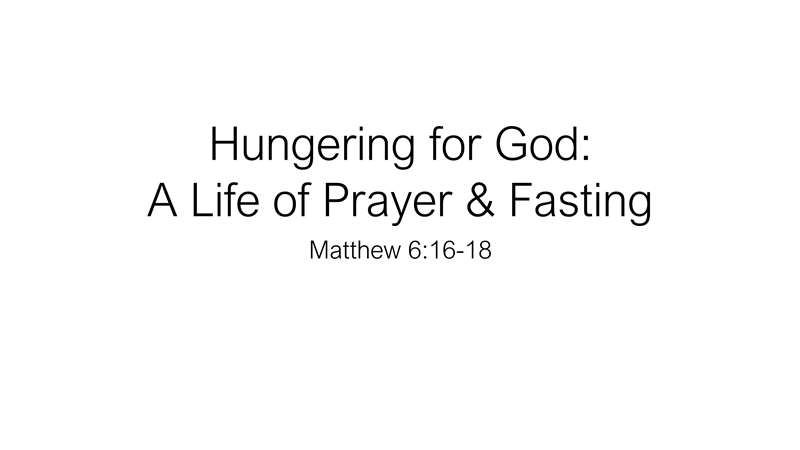
That was beautiful. As the elders and deacons of the communion service come and take these boxes, they're going to come down and pass them down the rows just like they do at communion. You're going to be getting a little packet like this, but as they're doing that, I invite you to join me in the book of Acts chapter 4. I'd like to read a Scripture that's going to frame the prayer that we're going to have after we all get these packets. And there's one packet for everyone, right down to any age you feel that your child could take that and use that and give that. Sometimes, in a better than we even could to someone that they know. But there's one for everybody that's in this room if you'd like one. But in chapter 4 of the book of Acts, starting in verse 23, in my Bible, there's a little header that says prayer for boldness. And basically, what had happened in the church that had been birthed on Pentecost is that the miracle of chapter 3 had led to the jealousy of the leadership of the temple. So, they arrested the apostles and roughed them up and tried to scare them. And after they threatened them, they released them, and that's where we pick up in verse 23 of chapter 4.
"And being let go, they went to their own and reported all that the chief priests and elders had said to them." That is so insightful. The gathered body of Jesus Christ is our own. It's the people that share the same calling, the same forgiveness, the same hope the same presence of God. And what a description of the church, our own. They went to their own and reported.
And then verse 24, "when they heard that, they raised their voices to God with one accord." So the church responds, hearing about all the threats and all the struggle and decided instead of going along with the atmosphere of suppression. See, that's what was going on in Jerusalem. The powerful were trying to suppress the Gospel.
Now, all of you just think, look up from your Bibles and think about something. What has been going on for decade after decade in America? No official prayer in public places, in schools and everything. Taking prayer out, and then taking God out, and then, get rid of every Ten Commandments anywhere that has anything to do with legal proceedings, and bar God from... and the whole suppression of God. It's basically a theme of our culture. And it's two sided. Officially, governmentally, there's a suppression, and then the media is trying to just so pollute us that God can't even fit into the mind. And so, we have this atmosphere of suppression of the glorious Gospel of Christ, and the beauty and wonder of our God. We share the same thing. Now, they're not yet roughing us up. They're not yet arresting us, regularly. And threatening us if we speak about Jesus Christ. Which, so we're not quite as far as they had gotten. But look what they do. They, with one accord lift their voice to God and said, I'm in verse 24, "LORD, you are God. You made the Heavens and the Earth and the sea and all that is in them," which is interesting. This is how the early church and the apostle’s viewed creation. That God directly made the Heavens, the Earth, the seas, and the creatures in the sea. Directly, You made them. That's interesting. So, they were creationists in the first century.
"Who by the mouth of your servant David," verse 25 said, and now comes this quotation of Psalm 2. "Why do the nations rage? And the people plot vain things. And the kings of the Earth take their stand. And the rulers were gathered together against the LORD, and against His Christ." And what they're saying is. A culture that suppresses God isn't suppressing the church. They're standing against God. See, we have to realize it's not us. I don't think anybody really thinks any of us individually are bad. They just don't like Him. But yet the church takes a step back in times like this, and you see it all around the country. There's this trying to not be offensive in any way possible because already God's offending everybody. So, we want to be cautious but look what they said. Verse 27, "For truly against Your holy servant Jesus, whom You anointed, both Herod and Pontius Pilate," and Gentiles and other people were gathered together. It's really vehemence and vitriol against Jesus.
Verse 28, But it's to do "whatever Your hand and Your purpose" determined before to be done. In other words, remember God is still totally in control of the situation. And here is the response. Verse 29, "Now, LORD, look on their threats." Look on the suppression of the Gospel that's going on in Jerusalem. In the context, directly, this is talking about an event in the first century. Look on how they're trying to keep God and His glorious Gospel from the marketplace. "And grant," verse 29, "to your servants, that with all boldness they may speak Your Word." Now that's, did you catch where I was going here? We live in a similar atmosphere of suppression of God. At every level of society. And our response is to be, to ask the Lord, verse 29, to look on that and to see that teachers are afraid of getting the NEA against them if they, or the superintendent, if they do anything about the Lord and you're going to be expelled from the team if you pray, and the coach if he prays with it. It's just, and we're seeing these threats, enveiled and unveiled.
So, Lord verse 29, look on all this they had, and we have, and back then they said, "grant Your servants", that was the first century church, "that with all boldness, they may speak Your Word". And we can echo that today. You know what one of the biggest fears most modern people have? Public speaking. Nothing scares everybody except for, the politicians and the salesmen and the show people. But everybody else really doesn't like to talk in public. Giving speeches and getting up in front. Do you know what's even more intimidating? Walking up to someone that is not a Christian, and trying to convey to them their hopeless, lost estate and horrific direction they're going. They're sitting on the edge of a cliff and they're ready to fall into the chasm of the blackness of darkness forever. God calls it suffering the vengeance of eternal fire. That's how God describes the end of those who are blind in sin, sitting in darkness, helplessly on the edge of the cliff.
Now, back to take that back out of your purse. Come on, get these back out. Some of you have hidden them. We need them for a moment. We're going to pray over them. I saw some of you tucking that away. We need it. This is a flashlight. Inside is the Gospel by John that the Lord can use to open the eyes of anyone to the Gospel of Jesus Christ. Inside is a personal invitation to all of our services, with childcare, all the contact information, the three services, the themes of them, what we're going to cover, and everything, and that they're welcome. And then five different presentations of the Gospel. The green one, to the church that have never made a personal relationship, never called the name of the Lord and been saved. The blue one with the cross and the Earth and the clouds is one of the simplest Gospel presentations I've ever seen, the one I've used most of my life. It's called God's Simple Plan of Salvation. And I just circle the verses and explain it. And on the big white space on the back, I write down my name and my email address if they want to talk further. And then I, this is the one I fold and put in my wallet every week. Jesus in the Koran, the black one there. A tool to cross into the life of the many the Lord is putting in our path. The El Camino Romano, the Hispanic version of the Roman's Road. The smallest one, the bridge illustration, showing that the cross is the bridge across this chasm ending in darkness forever. The cross of Jesus Christ, the sacrifice of Christ. He, giving Himself for me is the pat... and that's one of the most beautiful Gospel presentations. And then, if you discover, they go, oh yeah, I know about that! You say, but would you like to know more? We are hosting here at Calvary, Christianity Explored, which is a dinner, and it's a non-threatening small group circle discussions. Watch a video and go through and it's Christianity Explored, we're hosting again. So, these are your tools. This is your arsenal, your toolkit.
But collectively, I want you to understand as you take these, how God sees what we're doing. God looks down at Kalamazoo. That's where we are. We're not supposed to reach Seattle. Per se, or Boston, or Miami, or Phoenix. Kalamazoo. And when God looks down, He sees two groups. He sees those who have sight, those who have seen their lostness, confessed, forsaken, clung to Christ, repented, and embraced Him as Lord and Savior. And all of a sudden, we can see, and our whole lives change. All of a sudden, we look around, we go, whoa. Now I see why I'm here, my purpose, and I see my destiny. I see where I came from, and where I'm headed. Everyone else that you live next to, work next to, go to school next to, shop with and employ the services of, or employ in your service, everyone else is blind, spiritually. They're all sitting, or standing, right at the edge of an immense chasm. I was just in Florida, one of those sinkholes, I saw one. Poof! You heard about the guy, he was in his kitchen, and poof! They've never found him again; he just went poof! Down in that sinkhole, gone. Everybody you know is standing on the edge of a sinkhole. And they don't even see it. And they're headed over the edge. And you, if you care at all about it, if you saw a blind person stumbling along toward a gigantic hole in a parking lot and it was going to kill them, they were going to break their neck or drown or get crushed down there, and you saw them, no matter how far away, your heart would beat faster, and you would try either to wave at someone else, or you would scream across the way to them, Stop! Watch out! You can't see it. It's there. If you know it's there. And you see them going toward it, and you have even a sliver of compassion. You say something. This is a flashlight. If the people will take it and take any of these pieces, they will see enough, through the power of the Spirit, to realize what they're facing. And as Acts 17 says, they may reach out and say, God, where are you? I've heard about you all my life. I know you're out there somewhere. And, if they will reach out, God says, don't worry. I am not far from anyone on this planet. I am within an arm's reach. You just do the job. Share the Gospel. Tell them that you used to be blind. You almost went over the edge. Someone shared with you, the light of the Gospel, you receive Christ, and this sums it all up. And if you want to know more, Christianity Explored, come to a service. Do a Bible study. Read the Gospel of John. In fact, I'll read it with you if you want. You know what I mean? Just be bold. That's what this is about.
Now, look back in Acts chapter 4. got to finish this up. And so, it says in verse 30, after it says, "with all boldness, they may speak Your Word, by stretching out Your hand to heal, so that signs and wonders may be done through the name of Your holy servant Jesus." And you want to know the signs and wonders that the authenticating marks of the apostles and the spread of the Gospel in the first century are still going on in the sense that it is a marvelous, glorious miracle that you and I can each experience. To see someone come to Christ.
I just came back, this past week, I was at the Bible Institute Governing Board of all the sixty-nine nations of Word of Life Ministries. And I was sitting there, and on one side of me was a man, the Director of the ministry, and he told about how he was flying from somewhere to somewhere and got on the wrong flight because his flight was cancelled and everything. At 11 o'clock at night, and they seat him next to this woman who incessantly talked to him, loudly. And she said, I'm a single mom, I have two kids, I live in a hotel, I work at a restaurant, I don't have enough money, I'm taking care of two kids, in fact some nights we sleep outdoors, we don't have enough money and I'm trying to work my way through school and I don't have any money, and I'm a waitress, and I have two kids, did I tell you that? I'm a single mother. And what do you do? And by the time she got done with that ten-minute, monologue of her woes, all the people on this miniature bombardier thing are looking. They were right in the middle of the plane and people in front and behind them are all looking. It's like a reality show and they're all live watching the filming of it. This businessman sitting there with this woman, the waitress that has two, they all knew she was single mom with two kids, and didn't have any money, and slept outside with her two kids because she doesn't have any money. What do you do? He said, I'm the Director of Word of Life. She goes, what is Word of Life? That sounds interesting. What does Word of Life do? I'm a single mother. I'm a waitress. And he says, Word of Life is an evangelistic organization that spreads the Gospel of Jesus Christ through sixty-nine nations around the world, primarily working with young people. She said, what does that mean? And he pulled out his Bible. He said, would you like me to explain to you the Word of Life? What you really need to know? And loudly, she said, and all fifteen people are still listening, she says, whatever Word of Life is in whatever the Bible says, I would like to hear it, show me. And he would quietly share the Gospel. She'd say, let me read that out loud. And she would read the verse loudly for everyone. Everyone was participating on the airplane by the time this got over. It went for the entire forty- or fifty-minute flight from wherever to wherever. And finally at the end, Don said, did you know? You're a single mom. You have two children. You are a waitress, and you don't have enough money, and you're trying to go to school and there's a lot of more details. It was amazing. She was going to live with a rich guy that said, if you live with me, I'll take care of you. But, Don said, you know what you really need? You need to call the name of the Lord and be saved. Because you are blindly careening toward the edge. And, she said, still for everyone to listen, she says, I understand what you're saying, and I understand I'm a sinner. And she said, I'm not ready to give up my sin. What should I do? And it was interesting, Don said, I've never done this for my life. He said, I'm going to give you this Bible. He said, you read it to everybody on the plane and everyone's still looking at him. And he said, and you read, and you've heard, and you said the Gospel, and he wrote his name, his phone number, and the name of a local church because he travels the country. He knew a local church where she was. In the Finger Lakes region of New York. And he said, if God continues to work at your heart, on your heart, go and visit that church. That was about six weeks ago. He was telling us this on Tuesday. He said, I've never given up my Bible. He said, I gave up my Bible. She read it, and it was all marked with a Gospel. She said, I gave it to her. He said, this was Tuesday, he said, on Friday, she called me. She said, I went to that church. I sat through the service. I filled out the paper in the, like you heard about this morning, little contact form. She said, someone from the church knocked on the door of this place I'm staying with, this rich man. And they said, can we talk to you? And they said, sure. And she said, but I've already heard this from a man in the airplane. And they said, but have you responded? And she said, no. And there in her home, they led her to Christ. She's been to the church. She's been baptized. She called him and said, I got saved.
All because, look back in Acts chapter 4, "when they had prayed, the place where they were assembled together was shaken; they were filled with the Holy Spirit, and they spoke the Word of God with boldness." You know what Don told us? He said, I'm the paid director of a global ministry. When I got on that plane, the last thing I want to do is sit next to the waitress, with the two kids, this is a single mom, that's poor, and he said, I could have just said, I'm a businessman, thank you, and put my Bose surround sound on, and tuned out. But he said, I ask in that moment, Lord, fill me again with Your Spirit, and let me speak the Word of God with boldness. And he said, I was able to share the Gospel with fifteen people through the mouth of the single mom, with two kids, who just got saved last Friday.
Did you know the Lord could use anyone to lead that woman to the Lord, but He offered it to that man sitting next to her. The Lord can use anyone in the world to lead your teacher, your boss, your professor, your co-worker, your neighbor, your relative, to the Lord. He would like, and He has asked us, that if we love Him, we will keep His commandment to go into all the world and share the Gospel. He would like us to share our flashlight, earnestly, from our heart with someone that He's put us in their path. There's someone around us that God would love to use us to speak to. So, this is what we're going to do. We're going to have a prayer of dedication for this. So, everyone take your packet and hold it and stand up with me, okay? Here we go. Hold on to your packet. You don't want to lose it now. This is your priceless flashlight. You're going to get the privilege to use this week or in the next week, depending on when you get your divine appointment. And what I'm going to pray is two things.
Number one, that the Lord will refill us. Have you ever gone to a diner where they have those bottomless cups of coffee, and you get your sugar and your cream, and you stir it all up and it's just perfect. You take a sip, you set it down, you start talking and the waitress goes by. It's they just keep, I don't, you know why I don't like that? Because I have to sample it, put more sugar, more cream, get it back to perfect. I take another sip, put it down. But that's negative. Positively, God says, if you'll put your cup out to me. I'll keep it full to overflowing. That's the first thing we're praying for. Notice what it says. And they were all filled with the Holy Spirit. I thought they already were filled. I already read chapter 2. They got filled at the beginning. We need refilling. And so that's the first thing we're going to pray for right now.
And secondly, and they spoke the word of God with boldness. Do you know how you know you're full of the Spirit? You're boldly passing out flashlights. You're boldly sharing the Gospel. Because when the Holy Spirit fills, which means controls us, that's what He wants to do, and we want to do what He wants to do. So basically, this is a prayer saying, Lord, use this tool through me, Your servant, who needs boldness. And the way You grant boldness is by keeping me filled with Your Spirit. So, let's bow together.
Father in Heaven, thank You for all of the marvelous team of people. Actually, it's been dozens of people that have participated in gathering these materials, printing these materials, stuffing these materials, passing out these materials, actually meeting to even consider what we should do and when. But Lord, now we are a body. The body of Jesus Christ, a lampstand in the city of Kalamazoo and in this county. And you have given us as a body, as a local church, a responsibility to shine the light, to hold forth the Word of the glorious Gospel of Jesus Christ. And I pray that we as a church would embrace our calling and our individual responsibility, and we ask now that You would grant us boldness by filling us with Your Spirit. And we pray You might do this so that You would be glorified, in the name of Jesus, we pray. Amen.
You may be seated. As you're seated, I would encourage you to do one thing, because I've already heard it going on. I perambulate, you know what perambulation means? It means you go around like this. And I perambulate around the church, and I was perambulating around. And if you had gone by the nursery, you would have heard this little discussion. Two moms, one mom says, I found out who I'm going to give my packet to. And the other one says I'm still praying about who to give mine to. Who have you found out you're going to give yours to? And they said I'm going to try this. But if that doesn't work, I'm going to try that. And she said, Oh, that's a good idea. I'm going to try that and try that if that doesn't work. And they smiled and they walked away. What that was is they were encouraging one another and sharing so that they can pray together and rejoice together. You want to grow spiritually? Find someone you can do that with. Go to someone and say, I'm going to put this on the Cracker Barrel counter in the bathroom. I don't want to talk to anybody. I'm going to prop it up on the paper towel thing. Hope someone sees it, by the way, don't do that. This is broadcast. They'll think I made you do it, no solicitation there, but find someone else that, that you're wondering if they're bold and say, this is what I'm thinking. What are you thinking? Will you pray for me? In fact, pray I'll keep going. And won't give up. That is what the early church was all about. They went to their own. They saw the church as where they fit and were a part. How do you build that? By actually fitting and being a part and sharing these burdens.
Okay, let's go to chapter 6, or we'll never get there, of the Gospel by Matthew. And as you turn to Matthew 6, you remember we are in the midst of the Lord's Prayer. Matthew 6, in verse 11, is where we've gotten. In the middle of the Lord's Prayer is the fourth petition. There are seven petitions in the Lord's Prayer, starting in verse 9. Our Father, who art in Heaven, hallowed be Thy name, is the first petition for God to focus us on His grandeur and majesty. Thy kingdom come is our seeing that God is the ruler and saying, I want to be under Your rule, and I want You to rule me. Thy will be done means I want You to guide me through life. I want You to lead me. I'm going to walk behind You. You're my master. Those are the first three petitions. The fourth petition is in the middle. There's three before it, three after it. Boom. Give us this day our daily bread is right in the middle. So, we got to the middle petition. And as we got there, I noted that the prayer, if you notice, it ends in verse 13, goes on to verse 14. He continues with the concept of forgiveness. It's in verse 12 and verse 15.
But look at verse 16. The very next topic after prayer is what? What is verse 16's topic? When you, what? Jesus, just in the text here, connects prayer from the, actually the prayer thing starts in verse 5, all the way down through verse 15 with the very next topic, which is fasting. You know what's really interesting is, if you look in the Scriptures, most often, fasting is mentioned by the way thirty times in the New Testament, most often it's in conjunction with prayer.
Prayer and fasting seem to be a tool with two ends that are connected, that are used together, that works together. That's where we got last week. Now, what I want to show you in chapter 6 is the context of this. This is not, the bottom line what I'm trying to show you is fasting is not a command. The only people commanded to fast by God are Jews during the run up to the Day of Atonement. There's national fast and there's fasting going on and they're supposed to be sad over their sins and fast and show it. Only there, in a Jewish feast, is fasting commanded. For no one else. Nowhere else.
By the way, there's never a medicinal fasting that's commended in the Bible. There's no commandment dietary or religiously in the Scriptures for fasting. What's the big deal then? Why are we talking about this? That's what I want to show you. Because if you look at this, you find that Jesus assumes His disciples are doing certain things.
Now think back. When I went to school, I went to Haslett School System outside of Lansing. I had several teachers and coaches that I admired. They really, I could, I thought they got up every morning thinking about me, how to encourage me. And I remember that when my cross-country coach, he just said, boy, you're destined for great things. Oh, yeah. The great athlete. And he says, and the way that you'll be even greater is, he says, I noticed how you go up the hills when we're practicing. He rode around and watched us, and we killed ourselves running the hills, he found this really hilly area. And he says, if you will speed up going up the hills you'll become an even better runner. And you know what? I so admired that coach. That, he said, anybody can run fast in the flat and fast in the downhill. It's only the winners that, he used to call it, eat your guts on the way up. And as I was running up the hill, I was doing it, not because he made me. He didn't say, to stay on the team, you've got to sprint up the hills. It's because I admired him so much. I respected him so much. And His desires and expectations were something that motivated me.
How about a teacher that taught you something in music, like your music piano teacher that you thought was unbelievable and it inspired you and said you were going to be another great, great pianist? And they say, and you probably do your twenty minutes of, finger exercises, don't you? You didn't do those, but if the teacher expected you to and thought you should, you immediately wanted, see, there's a different way of motivating people than saying, do that. To say, you're probably already doing that, aren't you?
Have you ever been in a Bible study, and you sit down at the Bible study around the table, and the teacher says I'm sure that all of you have already outlined this and read it four times. He doesn't say, how many of you outlined and read this four times? If he did that, everyone would either quit the Bible study or feel under pressure. But if he said, now that's what I do, and I assume you've already done that too. It inspires you.
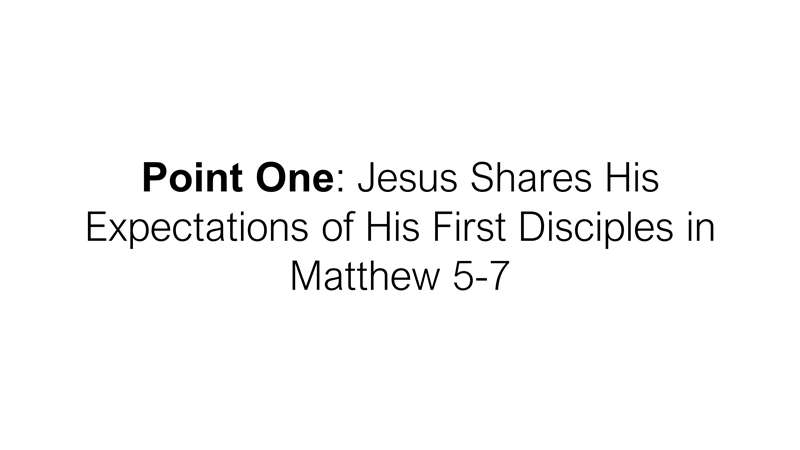
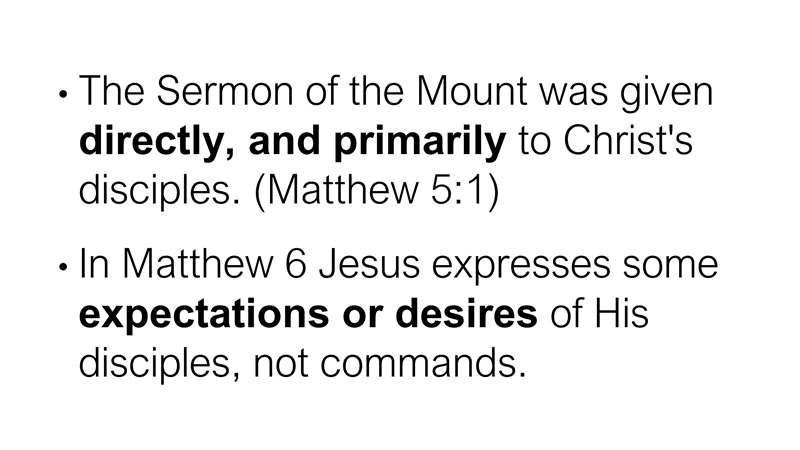
Now, watch. Because what we see is Jesus is sharing His expectations of His first disciples in the Sermon on the Mount. Matthew 5, 6, and 7 is Jesus sharing His expectations for His twelve disciples. Have you ever thought about that? Look back at chapter 5, verse 1. It's just across the page in my Bible. Look at the context of what we're talking about. Because the plain truth we'd all agree on, in fact, what I want to do is just do, remember I told you months ago, this is like we're at a coffee shop and we're having a Bible study. And you have your Bible, look at it, and I have my Bible, I'm looking at it, and I'm saying, do you see that? It's right there. You don't need any Bible dictionary. You don't need any theology or software. It's just, what does it say? What does chapter 5 say?
Look at verse 1. “And seeing the multitudes, He”, that's Jesus, “went up on a mountain, and when He”, that's Jesus, “was seated, His disciples came to Him”. The primary interpretation of this is that Jesus Christ saw the multitudes coming toward Him, went up on a mountain ahead of them with the twelve following Him, and the twelve disciples sit around Him. And soon it's a sea of people surrounding Him, but it's His disciples He's talking to, and the others are listening in the background. Like the airplane with my friend, that he was talking to the lady next to him. She was talking so loudly; she was heard by the entire plane. Jesus sees the multitude, sits with His disciples, and opened His mouth and taught them. He taught the disciples, and it flowed past them. The multitudes, depending on earshot, how close they were, heard these words.
But the first lesson is this is primarily Jesus sharing this with His disciples. So, the whole context of 5, 6 and 7 is Jesus training His twelve. Now it's spilling over in the multitudes by inspiration of God's Spirit of the Scriptures. It's, we're hearing today, I'm hearing Jesus’ talk. When you read the Bible, it's like you're sitting in the circle watching and hearing it. That's the marvel of the inspired word.
So, number one, the Sermon on the Mount was given directly and primarily to Christ's disciples. The Sermon on the Mount was given directly and primarily to the Twelve. Few would disagree with that. And if they did, they, they'd have to have three Bible dictionaries and two lexicons, and they'd try and prove their point, because it's just observation.
But now go to chapter 6, because I want to show you something. 5, 6, 7. Chapter 5. Now we're in chapter 6. Chapter 7. So, we would say we're in the middle of His talk. Of three chapters. We're in the middle. In Matthew 6, Jesus expresses some expectations, assumptions, or desires He has of His disciples. Not commands. That's the second point I want you to think about in your mind. First of all, who's He talking to? His disciples. In chapter 6, He gives them a series of assumptions. He assumed they were doing these things. Expectations. He would expect that they were doing it. He didn't tell them to do it. He just expected they were doing it. Desires. As His disciples, He just, He says, this is what you should be doing, right? You're already doing that, aren't you? He isn't belittling them. He isn't cajoling them. He's not forcing something on them. He's just saying. Now, you're doing this, aren't you? Like the piano teacher saying, you warm up for fifteen, twenty minutes, don't you? Doing that? To get your coordination.
Jesus, now watch how He does it, notice Jesus never commands these disciples to choose to do these disciplines. He doesn't say, I command you to do this. He just states them as assumptions that they would already be doing this. In other words, Jesus said, this is what I expect you are already doing as My disciples.
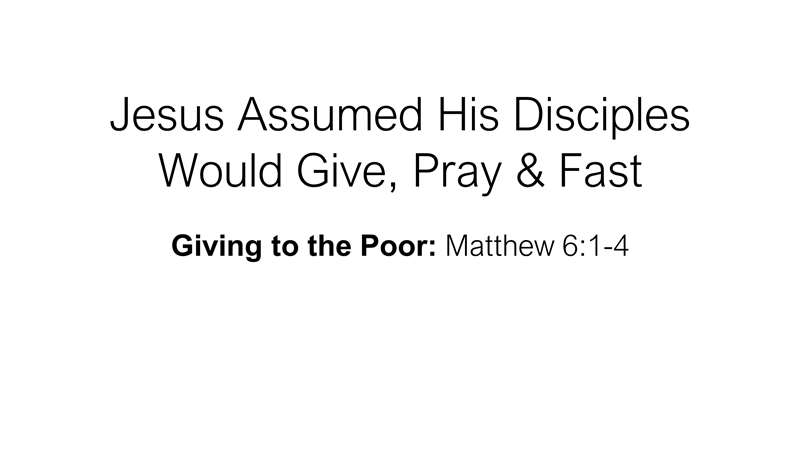
Now, what are the expectations? There's three of them. Jesus assumed three things and I'm going to just run through chapter 6 with you real quickly. He assumed that they would be giving to the poor, He assumed that they would be praying, and He assumed that they would be fasting. And watch this as you read. Notice the way Jesus introduces these three spiritual disciplines. Starting in chapter 6, verse 1. In verses 1 through 4, Jesus assumes they would be giving to the needy or the poor. It was Christ's expectation, as they sat in front of Him, on the hillside, it was His expectation that any disciple of His would be concerned and engaged in giving to the poor and needy.
Now, let me read it, like you're sitting there, and you're hearing Him say this, verse 1, chapter 6. "Take heed that you do not do your charitable deeds before men". Did you catch how He said that? He didn't say, do charitable deeds. He says, when you're doing your charitable deeds, don't do them to have people watch you. You notice that subtle way He put it? To be seen by them, otherwise, continuing in verse 1, "you have no reward from your Father in Heaven. Therefore," verse 2, "when you do a charitable deed, don't sound a trumpet." Do you see? Jesus is saying, you're doing this, aren't you? These are His expectations, His desires. He's assuming anybody that's His disciple is going to be involved in doing these charitable deeds, or alms, or giving to the poor. He just is telling them, make sure you do them the right way. You're going to be doing this. But make sure you do it the right way. And it's saying, when you wash your hands, use soap. I assume you're washing your hands. Make sure you use soap. I assume you're washing your hands. He doesn't say, wash your hands. He says, I'm assuming that you do it.
Okay, "don't sound a trumpet," verse 2, "before you as the hypocrites do in the synagogue and in the streets, that they may have their glory from men. Assuredly, I say unto you, they have their reward." It's whatever anybody thinks of them in the moment. But the one whose opinion lasts forever doesn't think that was good. That was what He's saying. Don't do stuff for people to commend you and pat you and see you do it.
Now look at verse 3. But "when you do a charitable deed," how does He say that? You're going to be doing these charitable deeds, right? You all do charitable deeds. You all give to the poor, right? You all give alms. You all do that, right? But when you do it, I assume all of you, if you're My disciple, you're doing that. "Don't let your left hand know what your right hand is doing. That your charitable deed may be in secret. And your Father who sees in secret will Himself reward you openly." Wow.
Now look up and think about that. What Jesus just said is, if we intentionally, privately, prompted only by the compassion of Jesus Christ, give to a poor person that will never, ever repay us. They couldn't. We'll never see them again. They don't have the means. They won't live so long. They'll never have two nickels to rub together. If we do that, look at verse 4, your Father, who is everywhere present, knows everything, who sees in secret, will Himself reward you openly. Could be in this life, but most certainly, when none of us are in a hurry. God's going to unveil all the secret, compassionate, sacrificial gifts that any of His disciples and followers and servants have done. For all the universe to know about, and He's going to reward us openly. That's number one. That's interesting. That was the first discipline that disciples were all sitting there going I haven't thought about that, I'm a disciple. I gave up everything to follow Christ. I didn't know I was still supposed to give to the poor people.
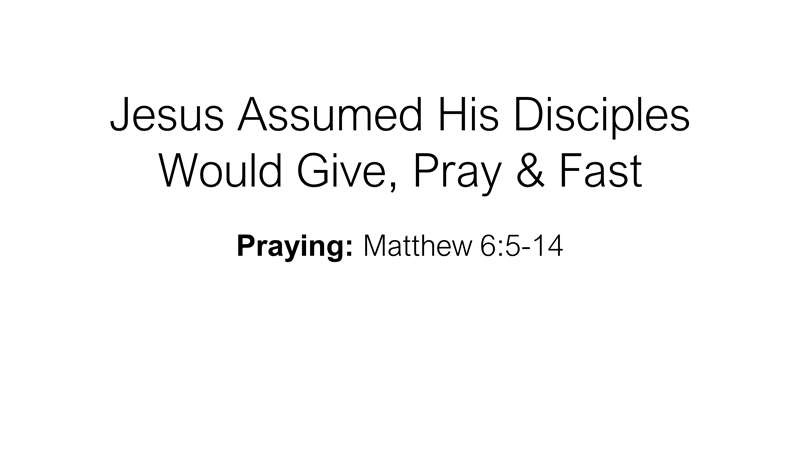
But here we go. Look at verse 5. Praying. He's already talking about giving the poor. Now praying. In starting verse 5 down to 14, Jesus assumes that they would be praying. It was His expectation that any disciple of His would be concerned and engaged in staying closely connected to God the Father by prayer. He doesn't tell them to pray. He assumes already that they are. Look at verse 5. “And when you pray. Don't be like the hypocrites”. They love to pray standing in the synagogues in the corners. They love to be seen by men. Assuredly, they have their reward, whatever they get in the moment. They've got it. But verse 6, but look at this, "when you pray," He doesn't say, pray! He says, when you're praying, I assume you are, I desire you to, I would expect you to. "When you pray," verse 6, "go into your room and when you have shut the door, pray to your Father who is in a secret place. And your Father who sees in secret will reward you openly."
Boy, we already know about that. Revelation 5:8 and Revelation 8:3 says that God has collected every single prayer I've ever offered. It's sitting in a bowl right in front of His throne, today. Every one. And He's got a bowl for you. How often are you making deposits? He's got a bowl for all of us. Jesus said, I assume. That's what God collects. He collects your prayers. He loves them. It's the only thing we see right in front of Him. That, from this world that, drops right at His feet. Instantaneously. Wow.
Now look at verse 7, "and when you pray, do not use vain repetition." I'm assuming you're praying, right? When you pray, don't use vain repetitions as they even do, for they think they will be heard for their many words. Therefore, don't be like them. "For your Father knows the things you need before you ask Him. In this manner, therefore, pray."
Now, in each of these, He's assuming, desiring, expecting that they're going to give to the poor, but He correctively says, this is the right way to do it. He assumes, expects, desires that they pray, but He gives them a pattern, and that's what we're right in the middle of. The Lord's Prayer is a pattern. Okay, so that's giving the poor and praying.
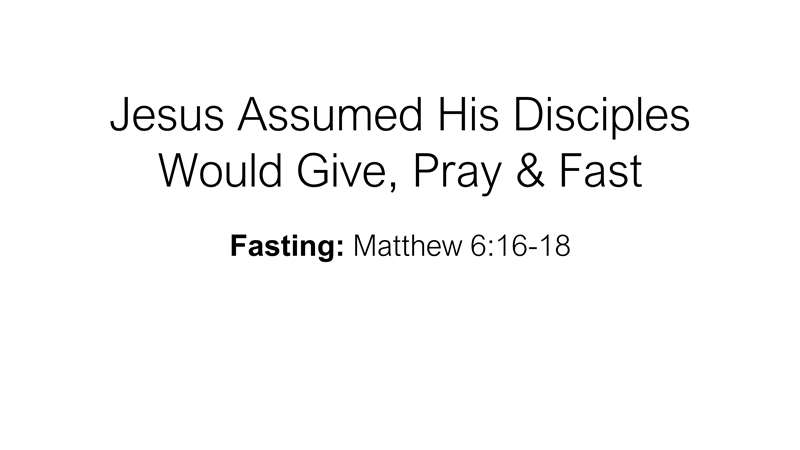
Now I'll go down to verse 16. In Matthew 6, verse 16, down through 18, Jesus assumes a third spiritual discipline of His disciples, which is fascinating to me. That, I think praying we've got, giving to the poor is in the periphery and fasting is out of sight. But not with Jesus. It's a tight package that's right in the heart. He knew that they'd probably be waning at the end of His sermon. He knew they might be fiddling at the beginning, so He saves this for the middle. When they've tuned in finally, they're sitting and it's comfortable and they're listening. And look what it says in verse 16. Jesus said it is His expectation that any disciple of His would be concerned and engaged in some form of fasting. And He says it repeatedly. Verse 16, "moreover, when you fast," not if, not you must. When. When. He's assuming that they already are. "When you fast, don't be like the hypocrites with sad countenance. They disfigure their faces that they may appear to men to be fasting." Assuredly, I say to you, that's the only reward they get.
Verse 17, but you, when you fast. You are fasting, aren't you? Can you imagine the power this is having on the disciples as they're hearing this? "Anoint your head, wash your face, so that you do not appear to men to be fasting, but to your Father who is in the secret place. And your Father, who sees in secret, will reward you openly."
By the way, Bible study question, verse 18. What's the context of the reward in verse 18? What is God rewarding for? What's the context? What's mentioned four times in verses 16 and 17 and 18? Fasting. God has a special reward He gives those who give compassionately to the poor. God has a special reward. He collects the prayers of those that pray to Him. God has a special reward. Look at verse 18. Your Father who sees this secret fasting, who you don't even appear to be fasting. In fact, you're all scrubbed up and look cheerful and well fed and happy. The Father who sees you in secret will reward you openly. Probably again, the Lord will connect the dots. Because He said that key things in the ministry of His church are accompanied by prayer that is surrounded with fasting. And He will show what happened because of that, that maybe we never know in this life.
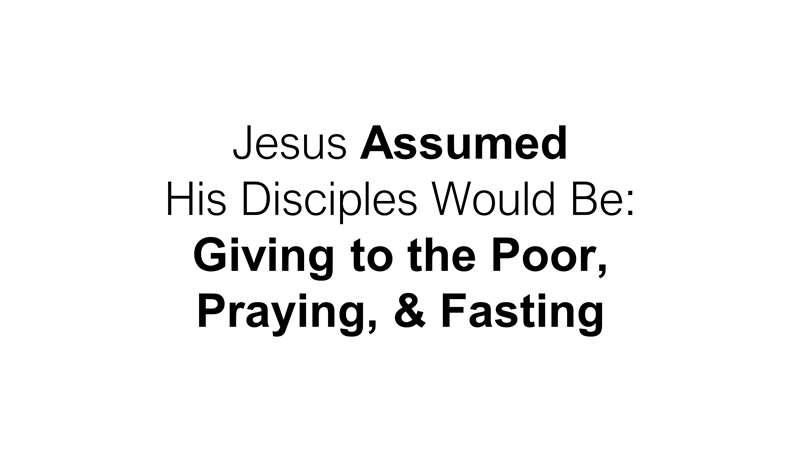
Okay, so basically, we can say, and I'm going to wrap this up, that we're looking right in the middle of a teaching lesson. We're in chapter 6; it starts in 5 and ends in 7. And Jesus expresses some simple disciplines He assumes they would already be doing, just as a part of their walk with God. And Jesus amplified every one of them with further teaching, but the assumption or expression of Christ for His disciples was, now, this is the twelve, and this is the first century, and these are the first disciples, and Jesus assumed, expected, that they would be giving to the needy, praying, and fasting.
Now, just for a moment, those seem to be so unconnected. If we were doing one of those intelligence tests, where they have all boxes of stuff, and you're supposed to put them in groupings, to show that you're not a dodo, that you can associate. If, in our box, we had charitable almsgiving, prayer, and fasting, those would not be like three fruits that go together. That just isn't normal in our minds, unless God tells us. Pause for a moment and think about the implications, because all Scripture is profitable for us, for doctrine. Showing us what's right, what God thinks is right. For reproof, showing us where we might not be right. For correction, to get us on the right path. For instruction in righteousness, to keep us on the right path. So, this has some value. We're also following Jesus today. We also love the Lord today, don't we? We also see Him as our Master, our Savior, our Lord, our King, our greatest Teacher the One who is better than a coach. He possesses us. We also want to please Him and do what He assumes and expects us to do, right? So, think through what He just said.
Compassionate giving. Jesus assumed those first disciples would be concerned enough about the poor because He was. Jesus' first emotion was compassion. Primary emotion. Despite the fact there was national laws for the welfare of the poor, instituted by God in Israel, more than any other nation. There was no institutionalized poverty in Israel. You had to leave huge swatches of your field uncut. You only could harvest in a circle. And the corners of a square field were left so that anybody at any time could harvest them that was poor. Plus, if you had an orchard, no fences. People could walk through and eat anything in it. They couldn't take it home in a basket. They could just eat. Nobody was destitute in Israel. Every fifty years, the land reverted back to the original owner. The mortgage was zeroed out. You got that. Fresh start. There was nationalized anti-poverty rules. So, you know what the people did? They thought, I don't have to do anything for those poor people, they should be going to the corners of the fields. And go walk through an orchard somewhere, I'm not going to give it to you. Get out and get a job. Jesus said, no. I expect my followers to have such compassion, even though there's a national... that if they see a poor person, they're like me. They give to them.
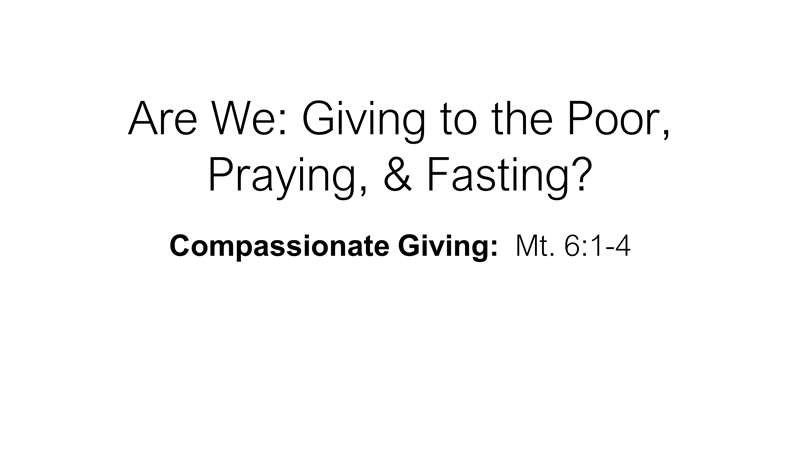
The question is, Jesus assumed that His disciples would have a heart of compassion that prompted them to give secretly, He added, to the poor and needy. I think we should each pause and examine our own heart and look if we have this type of compassion that draws us to give secretly to the poor and the needy. That's very Christ, oh, we have a welfare program. So do they. And Jesus said, My disciples are compassionate.
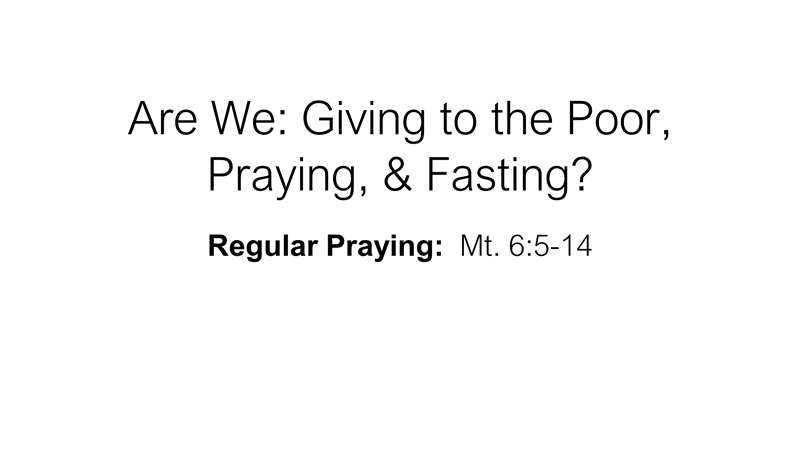
Secondly, regular praying. Jesus assumed that prayer was a part. And He said, I want your daily prayers directed toward God as your Father. And I laid out seven areas I want you to do. And I think we should each pause and examine our own heart and see if we have this type of need for God as our Father that draws us to pray following the pattern Jesus so clearly laid out. He didn't command it. To them He expected it.
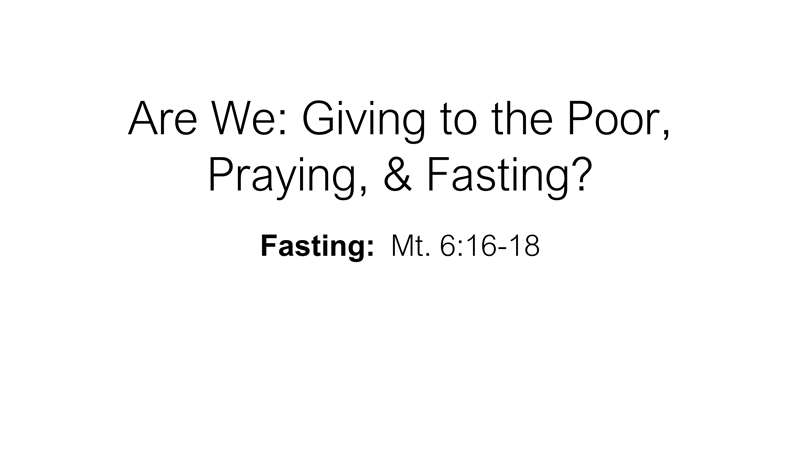
Finally, fasting. Jesus assumed that fasting was just a part of the fabric of their everyday life, so Jesus added a few reminders about directing your fasting to God and keeping it secret. I think we should each pause and examine our own heart and look and see if we've considered what type of hungering after God in fasting, we should practice for this reason.

And we have to go. Because it's one minute after departure time. Did you know when you look At the early church, at the most strategic decision the church made in Acts 13, the beginning of the discipleship, Great Commission following church in Antioch, when they began to, from the people they nurtured and discipled, when they began to see that there were some that needed to be sent out to take the ministry in Antioch and to spread it to the ends of the Earth. In Acts 13, what do they do? While they're ministering in discipleship, they're already fasting. But when the Holy Spirit said it's time to send out our missionaries, it says that they sent them out surrounded by prayer and fasting. The early church was involved in prayer and fasting because Jesus assumed they would be.
Let's all stand for a closing word of prayer. As you stand, you have your little packet with you. I hope that you will find someone to say, hey, will you pray with me this week? I've never done this before, or I've blundered before. I need God's strength to help me in time of need. And start sharing the blessings. When you see someone this week say, I passed mine out! They threw it in the trash. I went back, took it back, brushed it off. I'm going to give it out again! Or whatever happens, it will encourage, also the fellowship center is going to have thousands of these things till we take them all. So, let's use them as flashlights for the glory of God. Let's bow together.
Father in Heaven, thank You for our Lord Jesus so gently training the twelve and saying of course you give to the poor, of course you pray, of course I assume you're fasting. Lord, how I pray that Your expectations we see reflected in the early church, not as commands, not as impediments that we go overboard in, but just as expressions of our hunger to love You, serve You, and be like You, that You would lead us and guide us as we study this and incorporate in our lives in the days ahead. In the name of Jesus, we pray.
And all God's people said, amen, and God bless you as you go.